#we all have a moral responsibility to minimize harm
Explore tagged Tumblr posts
Text
american friends who live in solidly blue or solidly red states — please, please go vote today, even if it feels a little pointless.
i grew up in a swing state — in a very purple county of a large swing state, even — and so i got to come of age with this deep sense that my vote would someday Really Matter. i know that’s far from true for everyone. these days, it’s certainly no longer true for me — i’ve moved for work and now live in a very blue state. in some substantive and infuriating ways, my voice means less, now.
at the same time, this morning i got to vote on several ballot questions that will help shape my state’s education policy, support unions, and make it easier for the state to regulate and understand controlled substances without criminalizing their users. i got to vote for state and local officials. i got a cool sticker. today, in red and blue states across the country, folks are voting for the state and municipal actors who shape the character of local politics and the reality of most people’s day-to-day lives.
moreover, while my vote for Harris won’t really “count” all that much in the electoral college points allocation, it’s still a vote. it’s still momentum. it’s still a step closer to a decisive popular vote victory, which — at least in the eyes of the world, history, and my peers — still counts for something.
so, if you live in a swing state — please vote! our fate lies in your hands. the rest of us need you to turn out and carry us.
but if you don’t — please vote, too, and keep voting all the way down your ballot. you still get to shape your political reality, despite this super silly electoral system that we’re stuck with.
and besides — regardless of where you are, you get a sticker.**
(**unless you vote by mail, in which case — have a virtual sticker & my undying gratitude for your civic involvement: ⭐️)
#vote! vote! vote!#tbh they should send you a sticker with your mail-in ballot#also i understand that lots of folks are justifiably unhappy with their options this election#but a vote is a pragmatic move! it’s not a signal of undying love and devotion#we all have a moral responsibility to minimize harm#(also the argument that things are bad and therefore can’t worse rests on a total failure of imagination)#(if trump wins things ABSOLUTELY can and will get worse)#election 2024#us elections#us politics#kamala harris#american elections#tal talks
20 notes
·
View notes
Text
I've been reading some stuff on punitive justice, and it made something click for me that I've observed a lot online but haven't been able to put into words before.
When someone does something wrong, that's bad, and the damage it does needs to be repaired while the person needs to try to do better in future to minimize repeating harm. We learn it in preschool - say sorry, don't do it again. If they keep at it, remove them from the situation where they can do the harm until they prove they're responsible enough to go back in.
So if it turns out someone DIDN'T do anything wrong, that should be a relief! There's no damage to fix, no internal errors to correct. Less work for everybody, literally no harm done. False alarm, all good.
The thing I've observed is, lots of people want them to have done something wrong. There's almost disappointment when it turns out there's no harm done. And I think that's because of this general undercurrent of punitive justice as morally righteous and desirable: someone does something wrong, you get to punish them. Turns out they're innocent? That's disappointing. Find another reason you get to punish them, or find another bad person you get to punish. But at the core of it is that desire to punish someone. Someone you can hurt in a way that makes you a better person for hurting them.
This particular brand of almost cannibalistic pseudo-justice is super common in tumblr, one of the most ostensibly liberal spaces on the internet; I see more borderline savagery in online discourse here than in the actually toxic parts of the internet that are just openly cruel for cruelty's sake. It's always thrown me for a loop, and has frankly also hurt me, because on the rare occasions I get personally dogpiled, it only actually stings when it makes me worry that I've legitimately hurt someone. If I did something wrong, or more realistically when I inevitably do something wrong, that would make it good and right for people to give me shit about it every day until I'm dead.
The thing that clicked for me most recently was this bit in Ijeoma Oluo's Be A Revolution:
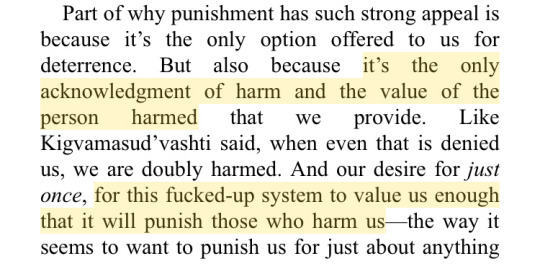
Punitive justice is specifically, uniquely appealing to people who have suffered injustices. Of course it's the Tumblr zeitgeist. Everyone here is a marginalized person failed by at least one system. Punishing someone for perceived injustice is how someone the system has deemed worthless proves their value in blood, even if the person being punished hasn't harmed you directly - even if they haven't harmed anyone. "Righteous" anger isn't about the target in these cases, it's about the inflicter. This is how much my pain is worth.
And that kind of violent validation is so alluring and so very dangerous. It seeks an outlet, wearing the justification of justice. Who's in reach? Who's an acceptable target this week? What's a good reason to use?
Is there anything they could do that would make me stop?
7K notes
·
View notes
Text
P-A-C DISCORD:
----------
Just a little bit of housekeeping. Bear with me.
You may call me Jackal. I'm an adult and literally do not give a hoot about what pronouns you use for me. I do not claim to be a good person. If I was a good person, this account would not exist. I am a civil and polite person, though, and I expect you all to be the same. I am a mechatronics major and previously a psychology major. The majority of the information I share here comes from some of the greatest minds to exist on this planet. Perhaps consider heeding it, especially if you have no formal education on the topic.
I do not write nor read most lolicon, incest, or bestiality content. I do not support pedophilia, incest, rape, or bestiality in real life. I do read lolicon of adult women with more youthful bodies, because that content helps me grow confidence in my own body, as I'm constantly mistaken to be a child despite being above the age of 18. I do hope all child-touchers, animal-fuckers, rapists, racists, and anybody else who harms a living thing out of ill will get the psychological help that they desperately need. To reiterate, this account is strictly ANTI-CONTACT. You can't control paraphilias but you can control the harm they cause.
I do support the protection of all things fictional, because if we make the things a few people find morally wrong to be illegal, we've then already lost when the folks on top go after fiction supporting LGBT, non-christian religions, etc.
I also support the protection of vent pieces, even if that vent centers around things like pedophilia, rape, etc. I am proud of you for taking yet another step towards healing from abuse you suffered in the past and/or from the harmful paraphilias that you struggle with currently.
This account is built on the notion that any interaction will be productive and good-natured regardless of the involved parties. You are free to give your stance on why proship is bad...so long as you accept the fact that people are then welcome to debate back on why proship isn't bad. Any debates that turn hairy will be ended, however, healthy debate and challenging your beliefs is a wonderful way to continuously educate yourself.
Despite my account, I do not intend on forcing a belief on you. In fact, I greatly support that you look at both anti-proship and proship content, and make the effort to educate yourself as well as possible and determine what belief you truly belong to. There is no good in trapping yourself in an echo chamber.
You are free to submit any points as asks or submissions. So long as they are productive and good-natured, I will post them, regardless of what side they take. If they are not productive or good-natured, they will either be deleted, or I will post them to both clown on you for being an asshole and educate you the best I can on why anti-proship is a rather harmful belief system.
Feel free to draw my attention to any posts I haven't reblogged yet that would fit in to this blog. I'll look them over and reblog them.
Most posts will be reblogs, asks, and submissions. However, I may occasionally post my own thoughts. These will often be tagged with #jackal barks, but sometimes I will forget. Any hate comments will be simply tagged as #hatemail
Please just block this blog if uncomfortable with the content. It's very glitchy on my phone, so most of the time, tags are incredibly minimal. I will not hold anything against you for blocking the blog. The whole point is that you are the one responsible for curating your online existence. If you dislike incest ships, block em. Dislike noncon content, block it. Dislike the contents of this blog, block me. You control what you see, just as others control what they see. Curate your feed, don't curate others.
Thank you all for reading this, and remember, if you let them destroy the fiction you find morally despicable, then when they come for what you enjoy and support, you've already lost.
----------
Ask/submission tagging system!
#pro stance - proshipper asks
#anti stance - antishipper asks
#no stance - asks of indeterminate standing
#birthday wishes - B O R T H
#hate mail - death threats and the like
#jackal barks - I'm Talkin Here!
#jackal pets - my fur babies!
#jackal rpf - rpf of me
#jackal ships - ships of me
#tot 2024 - askbox trick or treat for Oct 2024
#pac fanart - art of The Creature
#translation - transcriptions of images
----------
If you actually scrolled down this far, have a fun, exciting, and inconclusive list of beings I would be down to smash:
•Stain (MHA)
•Overhaul (MHA)
•EVA-01 (NGE)
•EVA-02 (NGE)
•Xue Yang (MDZS)
•Dark Schneider (Bastard!!)
•Kurloz Makara (Homestuck)
•Mothman
•Bigfoot
•u1146 (Cells At Work)
•The S.Q.U.i.P. (Be More Chill)
•Moder (The Ritual)
•Michael Myers (Halloween, especially RZ's version)
•Demon Drop (Intamin Freefall, 1st gen)
162 notes
·
View notes
Text
"Shame and guilt have followed humanity since Adam and Eve disobeyed God in the Garden of Eden."
Good Omens; a story of an Angel that can't accept love because of shame and a Demon that can't accept forgiveness because of guilt.

"It'd be funny if we both got it wrong, eh? If I did the good thing and you did the bad one."
An in-depth analysis of an Angel suffering from shame and a Demon wracked with guilt.
Let's dive deeper below the cut!
[Now I'm going to lay down a lot of facts, definitions and minimal psychological babble and I want you, as the reader, to view this through your GO nerd glasses. Also, I want to express that I am not a therapist or religious in any way- this was all done as academic research for the fandom's sake cause I can't shut my brain up. I tried to organize it the best I could. ..sorry it's so long but I swear it's worth the read through! ;)]
-------=======-------
• Shame is the painful emotion you have when you perceive that you are not good enough in some way. Entirely self imposed and only known to you, shame can be an unpleasant self-conscious feeling often associated with negative self-evaluation. When shame is chronic, it makes you believe that you are fundamentally flawed, defective, dishonorable, immoral, or improper.
• Guilt is a negative feeling of worry or unhappiness that you get because you have done something wrong. It's a moral emotion that occurs when a person believes or realizes- accurately or not- that they have compromised their own standards of conduct or have violated universal moral standards and bear significant responsibility for it. When guilt is chronic, it can be a toxic emotion that could cause a person to take on unjust responsibility if things around them go wrong. They are quick to accept that everything is their fault even though it isn't.
While guilt is about wrong actions, shame is about being wrong as a person.
-------=======-------
In academic psychology, shame is associated with avoiding failure and its consequences while guilt is connected with forgiving and improving one's self, along with making amends.
Guilt and Shame are often confused for each other but there’s a big difference between the two. Guilt can help you understand how your actions impact others, but shame is an inward-facing emotion that reflects how you feel about yourself. (And I do realize that Aziraphale may, at times, feel guilt and Crowley can also feel a sense of shame. But the main motivation behind majority of their characterizations and actions throughout the series are both coming from these two different feelings.)
Guilt can help you move forward while shame keeps you stuck in the past. [such as the "We could have been.. us." and "You go too fast for me." scenes] And the only way to rid themselves of these negative emotions is through recovery with unconditional love and forgiveness.
-------=======-------
• How Aziraphale represents the concept of shame •
Shame tricks you into believing that you aren't good. That you are worthless. Not that you've done something bad, but that you are bad. Ever since Aziraphale gave away his flaming sword, he started to question himself. But it wasn't until he outright lies to his fellow Angel's about the true fate of Job's children that he truly believes he has fallen- that he violated God's word and lied (again). He believes there must be something truly wrong with who he is as an Angel. He's a flawed creation of God and he feels a dreaded sense of deep shame from this.
Feelings of shame can also present itself in different types such as, Chronic Shame (negative emotions all the time that you aren't good enough), Performance Shame (feeling as though you are inferior compared to others) and Shame from Unrequited Love (this is a feeling of not being good enough for another person T^T).
Shame is a harmful, negative emotion that when internalized enough can result in an overly harsh evaluation of oneself.
-------=======-------
Next, let's take a closer look at what defines shame and how it operates through Aziraphale:
• Being Defensive is a way to avoid taking responsibility for our behavior.
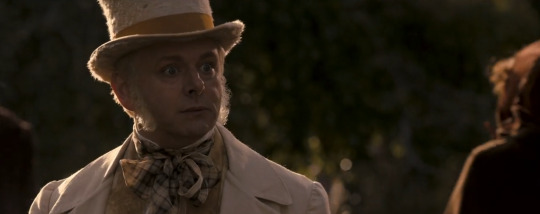
"I don't need you." "And the feeling is mutual!"
• Perfectionism is the unrealistic desire to be perfect and is often a defense against shame. If we’re perfect, no one can criticize us; no one can shame us. We keep up a front that looks good to the world. We may spend a lot of time attending to our dress and looks.

"I do have standards."
• Apologizing constantly. Shame can prompt us to be overly apologetic and compliant.
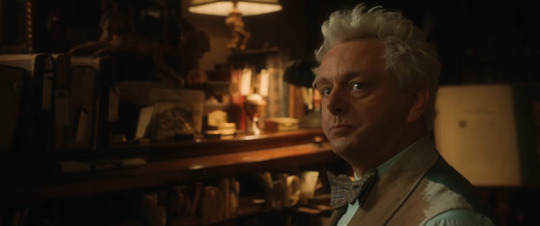
"I did the 'I was wrong' dance in…"
• Procrastination can occur from a deep hidden shame. If we consider pursuing something and it doesn’t turn out well, we might be paralyzed by that feeling. If we never try, then we don’t have to face possible failure and subsequent shame.
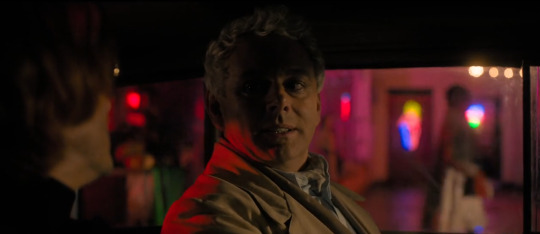
"You go too fast for me, Crowley.."
-------=======-------
Next are the four category behaviors resulting from shame:
• The Hot Response These are things you do when you feel ashamed and defensive, such as lashing out in anger or attacking the other person to deflect attention from yourself.
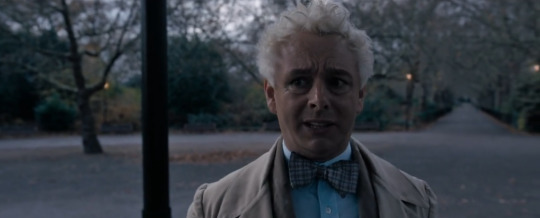
"I don't even like you!" [always resorts to being defensive in any argument]
• Behaviors to Cope With or Conceal the Shame These behaviors include doing things to make yourself feel small, trying to avoid being the center of attention, or not sharing your thoughts or feelings. Concealing yourself is a method of self-protection.
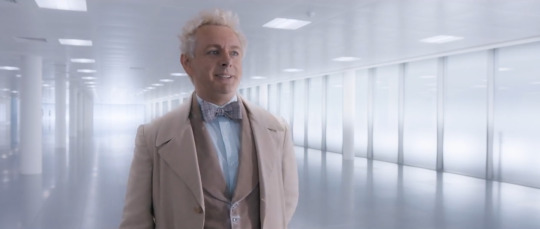
[always awkward and can't speak openly around other Angels]
• Safety Behaviors to Avoid Shame or Being Discovered This category of shame behaviors might be things like apologizing, crying, or avoiding conflict. People who have a tendency toward being emotional or avoiding conflict may be more likely to engage in safety behaviors.

"Why? What's wrong? I mean.. if there is something wrong.."
-------=======-------
The Impact of Feeling Shame:
• Makes you feel like you are flawed or there is something wrong with you
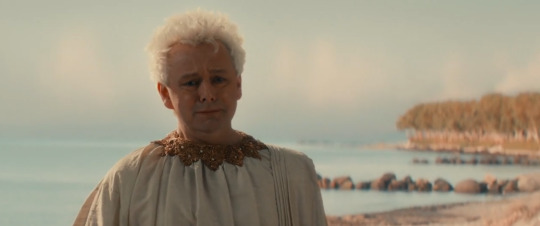
"I'm like you now. A demon. I'm a fallen angel.." • Can lead to social withdrawal
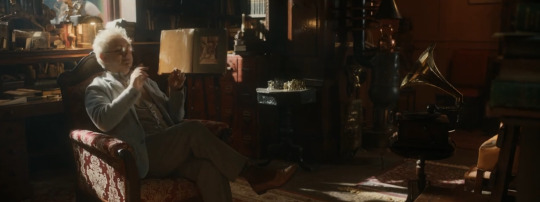
[spends most of his time in the bookshop alone] • May cause you to become defensive and shame others in return "I'm an angel! And you're a demon!" • May cause you to inflate your ego to hide the belief that you don’t have value
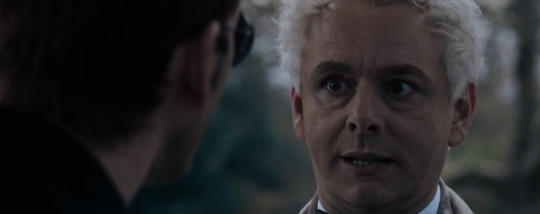
"Well, I am a great deal holier than thou. That's the whole point." • May leave you feeling empty, lonely, or worn out
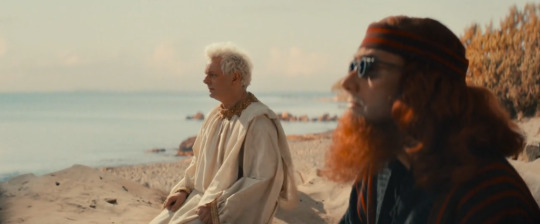
"But I thought you said it wasn't [lonely]?" • May lead to lowered self-esteem
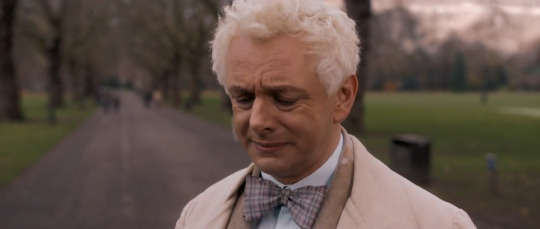
"I'm.. soft." • May make it harder for you to trust other people
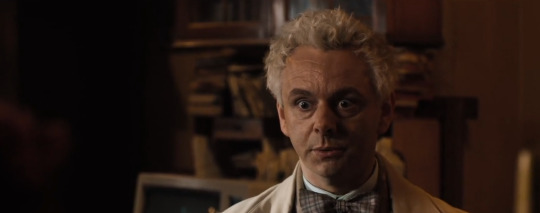
"Obviously, you're lying. You're a demon. That's what you do." • May lead to perfectionism or overachievement to try and counteract your feelings of shame
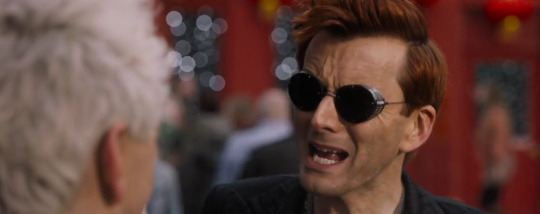
"If I can just reach the right people and resolve all of this-" "That's not going to happen! How could somebody as clever as you be so stupid!?" • May cause you to engage in people pleasing
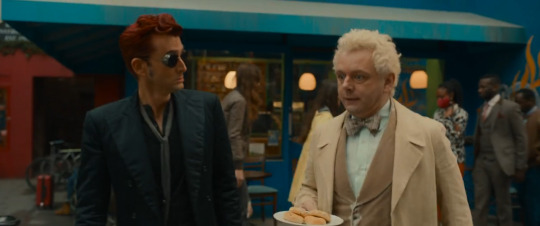
"Doing good again, Angel? "Oh, hardly counts. Purely for selfish reasons." • May cause you to avoid talking because you are afraid to say the wrong thing
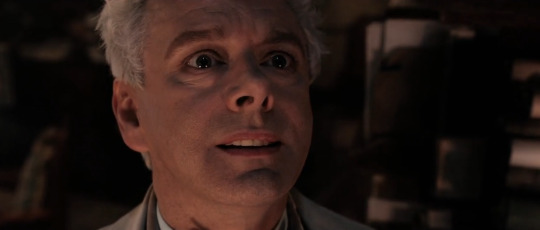
[trying to explain to Metatron in S1 without revealing too much] • May cause compulsive or excessive behaviors like overworking, excessive cleaning, or having too high of standards in general
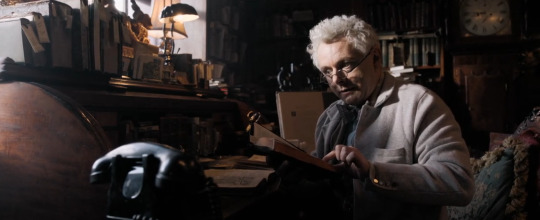
[non stop research all day and night to look for the antichrist by himself]
-------=======-------
• How Crowley represents the concept of guilt •
Guilt is what you feel after committing a specified or perceived offence/crime/bad action. It's typically attached to a feeling you experience when you do something wrong on purpose or accidentally and can regret that action. Guilt can be morally ambiguous.
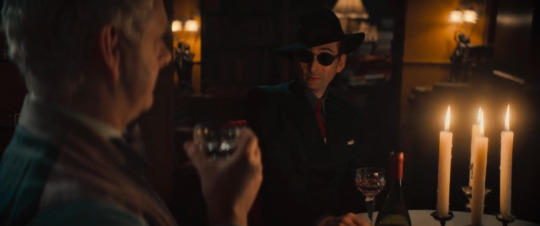
"Well, maybe there is something to be said for.. shades of grey?" "..Shades of dark grey."
Signs of guilt are unique but these are the most common (again there are many but these I thought related to Crowley the best):
• Low self-esteem
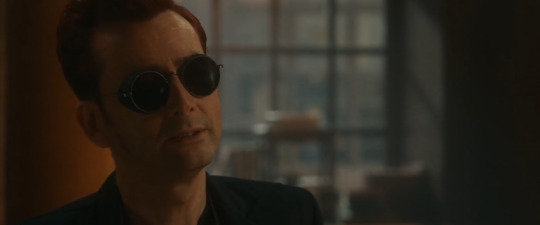
*sighs* "Don't bother..."
• Excessive attempts at reparation [Crowley always trying to secretly help humanity when he can]
• Being unable to meet someone’s gaze
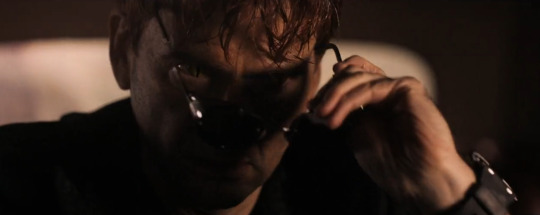
[Covering his eyes not only hides his snake eyes but also his guilty feelings]
• Anxiety "We are fucked!" [and we all know TV!Crowley is 100% more anxiety ridden than Book!Crowley is lol]
• Trouble sleeping [Sleeps too long (100 year nap from book). Or can't get comfortable sleeping (from S1 deleted scene)]
• Depressed mood
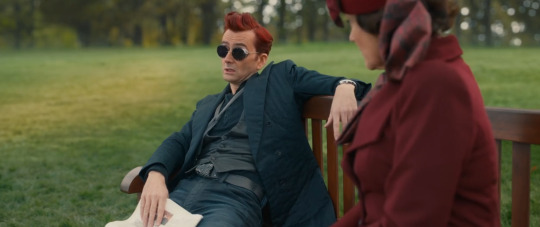
"What's even the point.. everything seems.. pointless.."
• Avoidance of people, places, or events linked to the cause of guilt "I'm not going to be joining their team and neither should you!" [doesn't want to return to Heaven or Hell and is "on his own side" to avoid them further] • Shifts in energy levels [can be giddy/jumpy one second to morose/moody the next, etc]
• Emotional outbursts
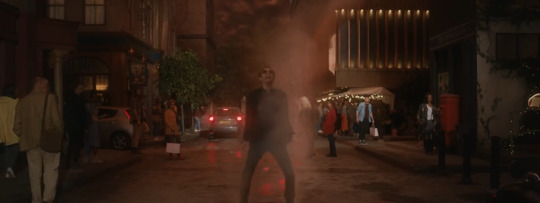
"I'm just so angry!"
• Appetite changes
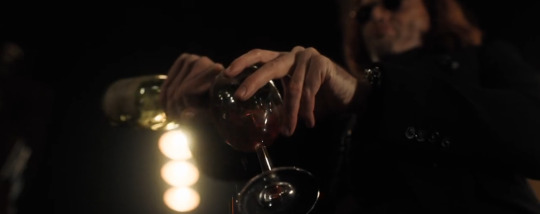
[took up drinking alcohol even though its unnatural to]
• Making amends [spends every moment since Eden trying to secretly do good despite the hellish consequences]
-------=======-------
Defense mechanisms against feeling guilty can become an overriding aspect of one's personality. (These are also related to trauma response.)
• Displacement is a defensive tool that may take the form of blaming the victim or taking your feelings out on others.
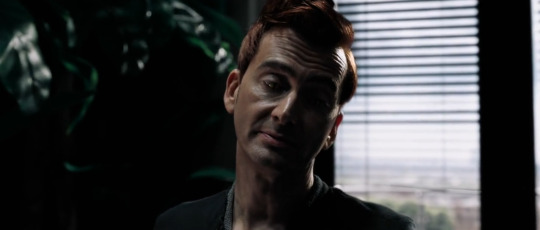
"You know what you've done. You've disappointed me."
• Projection is sharing the unacceptable feelings/qualities onto others, thereby being less alone with it.
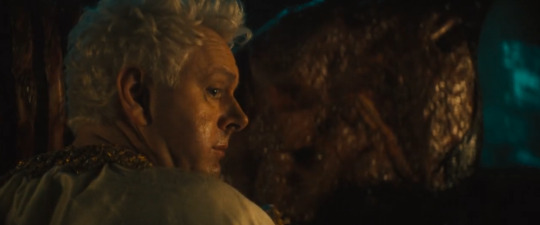
"But that sounds.." "Lonely?"
• Self-harm may be used as an alternative to compensating from one's past transgression. Not just physical self-harm but not allowing yourself to enjoy opportunities or benefits as a result of uncompensated guilty feelings.
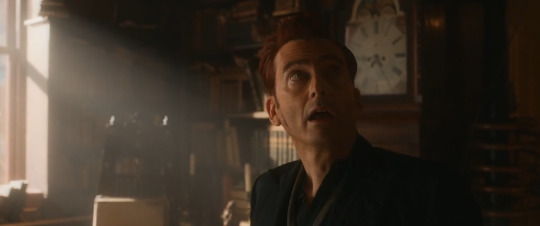
[always holding himself back for 6k years from saying what he truly feels and won't allow himself to be with Aziraphale the way he really wants]
• Repression is subconsciously blocking or forgetting harmful/traumatic memories. "Right.. looking at where the furniture isn't.." [doesn't remember his time in Heaven in detail- whether from trauma response or just had his memory wiped]
-------=======-------
Behavioral responses to guilt can be associated with the moral of their character. Feelings of guilt can prompt virtuous behavior.
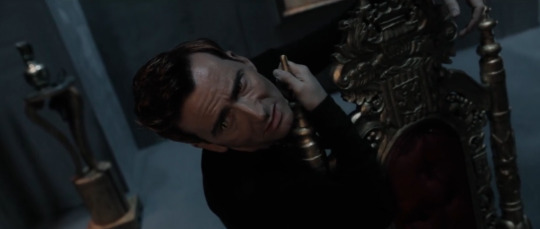
"You shouldn't test them to destruction.."
People who feel guilty may be more likely to: • Exercise restraint [holds his true feelings back for Aziraphale for centuries]
• Avoid self-indulgence [only really has his car and plants in the end]
• Exhibit less prejudice [is more open and accepting of other's sins - such as helping during the Scottish bodysnatching scenes]
-------=======-------
Guilt can prompt reparatory behaviors (actions to make amends) to help alleviate these negative emotions. People tend to engage in these reparatory behaviors toward the persons they wronged. Some religions theorize that forgiveness of sin (even those committed by accident or ignorance) is exclusively through repentance.
Crowley, being the wily serpent that tempted Eve to eat the forbidden apple of knowledge and subsequently getting her and Adam kicked out of paradise on Earth- and thusly creating the first sin of humanity. Right away, Crowley feels guilt from this.
After all, he was just told to stir up some trouble and had no idea the consequences of his first temptation on the future generations of human existence. Ignorantly doing something considered wrong and getting exiled.. this mistake would forever haunt him. He knows the pain and trauma from unwittingly doing something insignificant and being punished severely for it (such as asking questions or eating an apple) yet he accidentally made the first of God's new creatures "fall" in their own way from Eden. It's because of this guilt that Crowley spends the next 6000 years secretly rebelling against Hell to help humanity in any way he can to redeem himself.
-------=======-------
That's why their first conversation (post Fall from Heaven) on the wall of Eden was SO important to their relationship with each other and themselves.
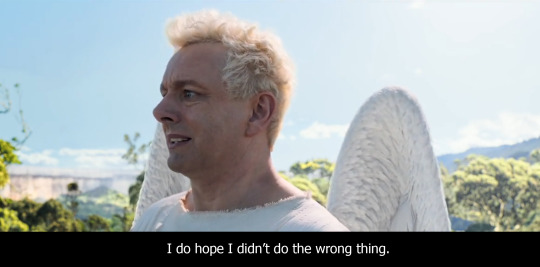
"Oh, I do hope I didn't do the wrong thing." "It'd be funny if we both got it wrong. If I did the good thing and you did the bad one." "No. No! It wouldn't be funny at all!"
I think the reason Crowley always seems to be one step ahead of Aziraphale (in more ways than one) is because, in a sense, guilt is easier to resolve from than shame.
If you acknowledge your mistake and the person chooses to take the steps to improve and change for the better, then they can recover from those negative feelings. They can work through the guilt by repairing the transgression or learning from it.
Whereas shame can only intensify inwardly and be harder to face because your mind is telling you that you are the bad thing, that you are the mistake. This makes it harder to overcome. And the only way to truly recover from shame is unconditional love and forgiveness- for yourself.
-------=======-------
“Instead of your shame, you shall have double honor, and instead of confusion, they shall rejoice in their portion. Therefore in their land, they shall possess double; everlasting joy shall be theirs.” (Isaiah 61:7)
And in S2.. we can see they both hold regret for their actions at the end of episode 6. If you look at every choice, ever misstep, every argument and their occasional confusion in understanding one another, you can see how Aziraphale was written with shame as a main part of his personality and Crowley written with guilt.
Two feelings that are often confused for one another but differ slightly in their own ways. The motivation behind every word they utter and every action they make throughout the series is built on the foundation of these two fundamentally negative and often traumatizing feelings.
There is a possibility to recover from shame and guilt and I have a feeling that S3's plot line will be all about recovery.
And that's what the concept of that Second Coming storyline might be all about. The New Testament says, "In Jesus Christ, God took upon Himself the sins of the world and died on the cross to pay mankind's debt" (Rom 6:23). "Those who repent and accept Christ's sacrifice for their sins, will be redeemed by God and thus not guilty before Him. They will be granted eternal life which will take effect after the Second Coming of Christ" (1 Thess 4:13–18).
A second chance. Forgiveness and Recovery from Sin.
And what is the story of Adam and Eve if not about humanity's Original Sin?
-------=======-------
Remember, after all is said and done, the antidote for shame is love, and guilt is cured through forgiveness.
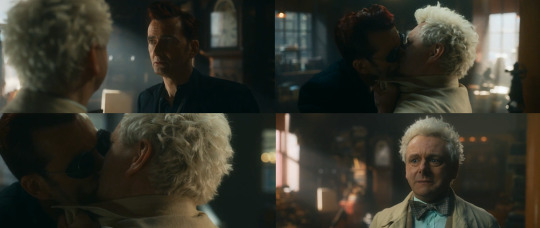
Two things a certain Angel and Demon struggle with accepting from each other but are more than willing to give to one another.
-------=======-------
[…There! I made myself sad again, lol. Thank you for reading this far! Sorry it was crazy long but I really enjoyed putting this all together into semi-comprehensible words (though stupid tumblr made me delete a bunch of pictures I had as examples…). Also, on a final side note- if you are ever experiencing overwhelming shame or guilt in anyway (which can result in depression or worse if not dealt with) please make sure you reach out to someone or seek professional help in some way. Take care, everyone! ^-^]
#Good Omens#Good Omens meta#Good Omens theories#Good Omens speculations#ineffable husbands#ineffable idiots#Crowley#Aziraphale#sorry it's so long.. it was longer#and had more pictures#but stupid tumblr restricted me lol#give me season 3 or give me death#good omens analysis#Neil Gaiman#Terry Pratchett#david tennant#michael sheen#I THINK I CRACKED THE CODE lol
260 notes
·
View notes
Text
God speaking of morally grey characters and FMA. It is SO funny how 03 managed to simultaneously make Mustang like... More evil, and also more woobified??
Like, ok, look at Mangahood Mustang right. Yeah, obviously he's a horrible person who did a fuckton of murder. He's also aiming for the presidency specifically with the goal of holding himself and other Ishvalan genocide veterans responsible for their crimes. In his post-war era, he also does his best to minimize unnecessary harm to others even when it would be easier not to (e.g. telling his men not to shoot to kill against Central's troops, coming up with a convoluted plan to fake Maria Ross' death) and is noted to go above and beyond for his subordinates. He has nuance! He's complex! He's a horrible person, yeah, but they're pretty up front about And That's Bad, and we also see what it is that makes other people support him. He doesn't get any sort of reward at the end of the series other than furthering his aforementioned political goals.
Meanwhile in 03, like... He's just outwardly a dick to everyone around him. He made Ed organize Tucker's research after the Nina incident, for fuck's sake! He never seems to do anything actually nice, he openly uses those around him for his own personal gain without doing anything for them. I don't remember them ever providing any reason as to why people should like him or what sets him apart from the rest of the military.
Except somehow, the narrative treats him like a hero. His subordinates all follow him unquestioningly for like, no discernible reason. He never faces any particular consequences for anything; He does lose an eye while fighting Pride, but this is more part of the #grimdark thing the show has going on than any sort of karma or anything, and we later see him dating Hawkeye. Dating! Hawkeye! HELLO???????
Like straight up 03 has Mustang kill Winry's parents instead of Scar and then they just use this as like... sadboy angst fuel. It's WILD. That's his motivation for wanting to become Fuhrer btw- When he killed Winry's parents he like, felt sooooo bad about it (AND APPARENTLY NOT ABOUT KILLING ALL THOSE ISHVALANS???) and tried to kill himself, but he was ~too much of a coward to do it~ or whatever, so he wants to become Fuhrer so that He Specifically will never have to follow orders he doesn't like. He just wants to be a dictator for the sake of being a dictator because they made him kill some Amestrians once and he didn't like it. Anyway did they write him like this
45 notes
·
View notes
Text
Because people seem to keep interpreting what I'm saying as trying to set rules for or censor authors, and I wanted to lay out my philosophy on ethical writing and media criticism in plain language. There are three broad pillars to how I approach it, which are below:
1) Authors are responsible for the content of their own work. There is a tendency to frame the adjudication of the ethics/morals/"goodness" of work as being essentially extrensic and reactionary--an author puts out a work and then people criticize it, and avoiding that criticism is the main reason why an author might try to avoid "bad things" in their stories. As a writer, I start from the other direction: I am always first and foremost responsible for what I write down in my story, and I have a responsibility to minimize the harm that work may do because I am a human being who lives in this world, not because someone might yell at me for it.
2) Any published work is open for critique. To me, there is a fundamental difference between writing something and publishing it, and once an author intentionally makes their work public, it can legitimately be criticized. This doesn't mean harassment, it doesn't mean flames, it doesn't mean being mean or petty or cruel. It doesn't even necessarily mean directing the critique at the author. But calling out racism or misogyny or ableism or simply critically discussing the content and message of a work is no less legitimate for a fanfiction than it is for an original published work, just as calling it out for a self-published work is no less legitimate than it is for one that went through a publisher. Things like readership/reach, cultural context, and other individuals involved can and should all be taken into account, but they don't make a work ineligible to be viewed critically.
3) Communities should have standards. I take the Nazi at the bar approach to community standards: when we welcome racists/misogynists/transphobes/etc. into our communities, then they become racist/misogynist/transphobic/etc. communities. And community standards are hard and nebulous and won't look the same thing everywhere, but there are ways that we can do them even on largely unmoderated places like AO3 and Tumblr. This is things like blocking people who express racist views, or not reccing misogynist stories, or standing up for Black fans or Fans of Color or disabled fans etc. Communities can say, we won't welcome Nazis in our communities. We won't welcome racists in our communities. We will ice them out, block them, not engage positively with their work.
Note that I didn't say start moderating AO3 or burning all the books that don't match our ethics. I'm talking about communities (fandoms, romance novel BookTok, whatever) taking responsibility for themselves and moving away from the idea that we can't have any say in who is in our community because it's the equivalent of censorship.
Every time people defend the presence racism in fandom, they make fandom less safe and welcoming to Fans of Color. Every time they defend antisemitism in the romance community, they make it less safe and welcoming to Jewish fans. That is what community standards are about.
111 notes
·
View notes
Text
Be for real.
Something that continues to vex me is this common presumption from centrist liberals that radicals are demanding strict moral purity or asking for far too much because genocide is an inherently unacceptable consequence for us and we refuse to be complacent about it.
It actually reads as far more "doomeristic" to respond to opposition on these grounds with "oh, here you go getting on your soapbox about genocide again 🙄" as if the scale of these atrocities were some minor issue brought up by a fringe group and not literally millions of people, as if this issue doesn't connect with multiple others. The implications are far-reaching and incredibly serious, yet are dismissed as flippantly as it would be if they were crying over spilled milk.
This is a familiar and predictable pattern with electoralists in general and apologists for imperial regimes, however. There's an obvious biased attitude that shows itself in the overemphasis on the so-called achievements of their favored parties and individual political authorities, while doing their dirty work by minimizing every harm they've committed.
They aren't even fully responsible for these achievements, by the way. Grassroots activists who have sacrificed and dedicated their lives to improving material conditions for the masses are erased while politicians and their constituents are given all the credit for it.
Apologists don't change anything and continue to enable the very fascist tendencies they fearmonger about precisely because they keep painting an incomplete picture of the situation and misrepresent the people calling for actual change instead of a mere changing of the guard. They get mired in futile "harm reduction" rhetoric while the harm only continues to escalate to the point of genocide, then blame the people who consider this escalation a deal-breaker, something that can't be meaningfully compromised with.
Just imagine, being under settler military occupation and bombardment, only be told you must compromise with the very people responsible for it, and that if you don't you'll be threatened with worse occupation and bombardment so you had better show up in support of the "less evil" genociders. This is gaslighting and abuse, plain and simple.
If we were to reduce the scale of this scenario to a violent, power-hungry husband and a wife suffering from domestic abuse, we can't honestly claim to be on the wife's side by telling her to flee to the house of someone who "only" beats her 2 days out of the week and not 5...we'd try to get her out of the situation by any means necessary. We certainly wouldn't be engaging in the dishonest and shameful tactic of bringing up how the husband donates .001% of his income to a local charity on occasion for tax write offs.
From this perspective, we might start to better recognize the apathy and anti-social conditioning it would require in order to tolerate or excuse such behavior, but when it comes to mass-death, it magically transforms into a simple math equation. "100 thousand dead is less than 200 thousand dead, so I guess 100 thousand dead is good" is a bleak and terrible consideration that forces us to view the lives of others as numbers and things whose existence are strictly theoretical and useful only to prove a point. It's repulsive to conflate any ideology that would force you to make such a calculation with the egalitarian worldview.
"Harm reduction" isn't about condemning thousands to death while smugly chastising those who view even one more victim as a cost too great. It reveals a deeply unsavory fact about the values of the people who use these kinds of arguments; that they think of their actions as "progress". Delaying the spread of the disease of fascism and directly opposing it on a conceptual and material basis are not the same thing. "progress" would look like decolonization and actual healing process taking place, where the long-standing grievances are finally addressed and the powers-that-be no longer exist to commit more harm in the first place.
This is not what electoralists want, however, because they lack the imagination, initiative and capacity to struggle and make this a reality. This is evident in the fact that their first impulse is to throw the people with these desires under the bus in favor of more elections and repeating the same debunked clichés about electoral politics ad-nauseam.
There's no honest desire from these administrations to bring about the end of this genocide, and there is no place for decolonization of the land on the ballot, because these things are integral parts of the empire's state mechanism itself. To do away with them would mean they have become obsolete. Acknowledging this isn't moralistic grandstanding, it's a conclusion drawn by analyzing the track record of this country, its various internal structures and its controllers.
Solidarity's foundation is trust, a sense of real interdependence. Neither is possible if someone whose immediate reaction to displeasure about genocidal policy is made out to be a trivial and hypocritical nuisance by their associates. Whose side are y'all on, anyway?
27 notes
·
View notes
Note
are there any medium articles or other essays you've written that you have a different perspective on now? Whether a small bullet point or the entire objective of a piece. It's interesting following your journey while catching up on the archive
Ohhhh yeah. In a big way. My thinking on nearly all matters continues to evolve, so much so that I always cringe a bit at some phrasings in my books by the time they are out.
In my work on Medium you can see a strong inconsistency in how I think about several topics -- I've gone through periods of disparaging my family, to extending them grace, to thinking I have a moral responsibility to fight with them, to regretting my rage at them, to calling my parents abusive, and on and on. On this topic, it's not so much that my feelings have changed, so much as each point of view represents one facet of the same gem I'm spinning in my mind's eye.
My thoughts on sexual assault and justice have evolved a ton. Around the time of the Weinstein and Ansari accusations, I wrote a lot about rape and coercion. Then a dear friend experienced an assault and was not believed by a huge friend group that we shared and I took on an even more hardline, believe-all-victims-and-take-action-swiftly-to-protect-them stance. I was more traumatized and dysphoric back then too.
My hardline stance eventually came into conflict with my abolitionism, and my growing respect for the importance of personal discernment that emerged more and more over the course of the pandemic. I just saw too many people who were afraid to exercise their own discernment on a wide array of topics and who amplified vague callouts of all kinds without skepticism (god, remember the Wayfair conspiracy?), and I saw how such formless accusations harmed the marginalized in particular. And all the gormless attacks on "narcissists" as the cause of abuse really chilled me. all that strongly tempered my dogmatism.
But I have also witnessed the "anti cancel culture" squad fail to live up to any value system whatsoever and I have fought with them a lot quite openly over their frequently racist, transphobic, theory-free views. All I know today is that navigating these waters is very, very hard, and that I am only in control of living by my values and being outspoken about them and that attempts to manipulate a moral response out of other people don't work and that information is only as good as my knowledge about who and where it came from. I think my evolution on all this closely tracks with the shifts in the zeitgeist -- it's rare for me to be that on pace with the average person I meet.
My perspective on how a meaningful difference in the world is made has changed. In 2016 I was calling politicians for an hour every day on livestream to protest this or that conservative bill. Now i'm an anarchist with minimal regard for electoral politics or any formal institutions. I did vote for Brandon Johnson though.
But by far the piece that least reflects my current understanding of things is one from 2020 called "Against Community." But that one was never meant to be a prescription for how people should live their lives. It was just a description of where I was at emotionally, having watched multiple friend groups disintegrate over abuse, triangulation, and bad boundaries. I'm glad I don't have to feel that way now. It was the growth after that experience that led to my revelation that communities are just relationships you build, and keep building, not static places you find.
On the whole I am less angry now, less dogmatic, less inclined to believe that electoral work matters or that posting is activism, less hellbent on making everybody agree with me, more comfortable with mourning, more radical, more patient, less grandiose and less hung up on what other people think of me. Despite all that i am still a very arrogant angry neurotic stressed out self superior insecure person.
Thanks for this great question. When I hold fake interviews with myself in the shower, it's being asked things like this that I fantasize about.
83 notes
·
View notes
Text
Ending Radical Indoctrination in K-12 Schooling
Issued January 29, 2025.
By the authority vested in me as President by the Constitution and the laws of the United States of America, it is hereby ordered:
Section 1. Purpose and Policy. Parents trust America's schools to provide their children with a rigorous education and to instill a patriotic admiration for our incredible Nation and the values for which we stand.
In recent years, however, parents have witnessed schools indoctrinate their children in radical, anti-American ideologies while deliberately blocking parental oversight. Such an environment operates as an echo chamber, in which students are forced to accept these ideologies without question or critical examination. In many cases, innocent children are compelled to adopt identities as either victims or oppressors solely based on their skin color and other immutable characteristics. In other instances, young men and women are made to question whether they were born in the wrong body and whether to view their parents and their reality as enemies to be blamed. These practices not only erode critical thinking but also sow division, confusion, and distrust, which undermine the very foundations of personal identity and family unity.
Imprinting anti-American, subversive, harmful, and false ideologies on our Nation's children not only violates longstanding anti-discrimination civil rights law in many cases, but usurps basic parental authority. For example, steering students toward surgical and chemical mutilation without parental consent or involvement or allowing males access to private spaces designated for females may contravene Federal laws that protect parental rights, including the Family Educational Rights and Privacy Act (FERPA) and the Protection of Pupil Rights Amendment (PPRA), and sex-based equality and opportunity, including Title IX of the Education Amendments of 1972 (Title IX). Similarly, demanding acquiescence to "White Privilege" or "unconscious bias," actually promotes racial discrimination and undermines national unity.
My Administration will enforce the law to ensure that recipients of Federal funds providing K-12 education comply with all applicable laws prohibiting discrimination in various contexts and protecting parental rights, including Title VI of the Civil Rights Act of 1964 (Title VI), 42 U.S.C. 2000d et seq.; Title IX, 20 U.S.C. 1681 et seq.; FERPA, 20 U.S.C. 1232g; and the PPRA, 20 U.S.C. 1232h.
Sec. 2. Definitions. As used herein:
(a) The definitions in the Executive Order "Defending Women from Gender Ideology Extremism and Restoring Biological Truth to the Federal Government" (January 20, 2025) shall apply to this order.
(b) "Discriminatory equity ideology" means an ideology that treats individuals as members of preferred or disfavored groups, rather than as individuals, and minimizes agency, merit, and capability in favor of immoral generalizations, including that:
(i) Members of one race, color, sex, or national origin are morally or inherently superior to members of another race, color, sex, or national origin;
(ii) An individual, by virtue of the individual's race, color, sex, or national origin, is inherently racist, sexist, or oppressive, whether consciously or unconsciously;
(iii) An individual's moral character or status as privileged, oppressing, or oppressed is primarily determined by the individual's race, color, sex, or national origin;
(iv) Members of one race, color, sex, or national origin cannot and should not attempt to treat others without respect to their race, color, sex, or national origin;
(v) An individual, by virtue of the individual's race, color, sex, or national origin, bears responsibility for, should feel guilt, anguish, or other forms of psychological distress because of, should be discriminated against, blamed, or stereotyped for, or should receive adverse treatment because of actions committed in the past by other members of the same race, color, sex, or national origin, in which the individual played no part;
(vi) An individual, by virtue of the individual's race, color, sex, or national origin, should be discriminated against or receive adverse treatment to achieve diversity, equity, or inclusion;
(vii) Virtues such as merit, excellence, hard work, fairness, neutrality, objectivity, and racial colorblindness are racist or sexist or were created by members of a particular race, color, sex, or national origin to oppress members of another race, color, sex, or national origin; or
(viii) the United States is fundamentally racist, sexist, or otherwise discriminatory.
(c) "Educational service agency" (ESA) has the meaning given in 20 U.S.C. 1401(5), and the terms "elementary school," "local educational agency" (LEA), "secondary school," and "state educational agency" (SEA) have the meanings given in 34 C.F.R. 77.1(c).
(d) "Patriotic education" means a presentation of the history of America grounded in:
(i) an accurate, honest, unifying, inspiring, and ennobling characterization of America's founding and foundational principles;
(ii) a clear examination of how the United States has admirably grown closer to its noble principles throughout history;
(iii) the concept that commitment to America's aspirations is beneficial and justified; and
(iv) the concept that celebration of America's greatness and history is proper.
(e) "Social transition" means the process of adopting a "gender identity" or "gender marker" that differs from a person's sex. This process can include psychological or psychiatric counseling or treatment by a school counselor or other provider; modifying a person's name (.e.g, "Jane" to "James") or pronouns (e.g., "him" to "her"); calling a child "nonbinary"; use of intimate facilities and accommodations such as bathrooms or locker rooms specifically designated for persons of the opposite sex; and participating in school athletic competitions or other extracurricular activities specifically designated for persons of the opposite sex. "Social transition" does not include chemical or surgical mutilation.
Sec. 3. Ending Indoctrination Strategy. (a) Within 90 days of the date of this order, to advise the President in formulating future policy, the Secretary of Education, the Secretary of Defense, and the Secretary of Health and Human Services, in consultation with the Attorney General, shall provide an Ending Indoctrination Strategy to the President, through the Assistant to the President for Domestic Policy, containing recommendations and a plan for:
(i) eliminating Federal funding or support for illegal and discriminatory treatment and indoctrination in K-12 schools, including based on gender ideology and discriminatory equity ideology; and
(ii) protecting parental rights, pursuant to FERPA, 20 U.S.C. 1232g, and the PPRA, 20 U.S.C. 1232h, with respect to any K-12 policies or conduct implicated by the purpose and policy of this order.
(b) The Ending Indoctrination Strategy submitted under subsection (a) of this section shall contain a summary and analysis of the following:
(i) All Federal funding sources and streams, including grants or contracts, that directly or indirectly support or subsidize the instruction, advancement, or promotion of gender ideology or discriminatory equity ideology:
(A) in K-12 curriculum, instruction, programs, or activities; or
(B) in K-12 teacher education, certification, licensing, employment, or training;
(ii) Each agency's process to prevent or rescind Federal funds, to the maximum extent consistent with applicable law, from being used by an ESA, SEA, LEA, elementary school, or secondary school to directly or indirectly support or subsidize the instruction, advancement, or promotion of gender ideology or discriminatory equity ideology in:
(A) K-12 curriculum, instruction, programs, or activities; or
(B) K-12 teacher certification, licensing, employment, or training;
(iii) Each agency's process to prevent or rescind Federal funds, to the maximum extent consistent with applicable law, from being used by an ESA, SEA, LEA, elementary school, or secondary school to directly or indirectly support or subsidize the social transition of a minor student, including through school staff or teachers or through deliberately concealing the minor's social transition from the minor's parents.
(iv) Each agency's process to prevent or rescind Federal funds, to the maximum extent consistent with applicable law, from being used by an ESA, SEA, LEA, elementary school, or secondary school to directly or indirectly support or subsidize:
(A) interference with a parent's Federal statutory right to information regarding school curriculum, records, physical examinations, surveys, and other matters under the PPRA or FERPA; or
(B) a violation of Title VI or Title IX; and
(v) A summary and analysis of all relevant agency enforcement tools to advance the policies of this order.
(c) The Attorney General shall coordinate with State attorneys general and local district attorneys in their efforts to enforce the law and file appropriate actions against K-12 teachers and school officials who violate the law by:
(i) sexually exploiting minors;
(ii) unlawfully practicing medicine by offering diagnoses and treatment without the requisite license; or
(iii) otherwise unlawfully facilitating the social transition of a minor student.
(d) The Assistant to the President for Domestic Policy shall regularly convene the heads of the agencies tasked with submitting the Ending Indoctrination Strategy under subsection (a) of this section to confer regarding their findings, areas for additional investigation, the modification or implementation of their respective recommendations, and such other policy initiatives or matters as the President may direct.
Sec. 4. Reestablishing the President's Advisory 1776 Commission and Promoting Patriotic Education. (a) The President's Advisory 1776 Commission ("1776 Commission"), which was created by Executive Order 13958 of November 2, 2020, to promote patriotic education, but was terminated by President Biden in Executive Order 13985 of January 20, 2021, is hereby reestablished. The purpose of the 1776 Commission is to promote patriotic education and advance the purposes stated in section 1 of Executive Order 13958, as well as to advise and promote the work of the White House Task Force on Celebrating America's 250th Birthday ("Task Force 250") and the United States Semiquincentennial Commission in their efforts to provide a grand celebration worthy of the momentous occasion of the 250th anniversary of American Independence on July 4, 2026.
(b) Within 120 days of the date of this order, the Secretary of Education shall establish the 1776 Commission in the Department of Education.
(c) The 1776 Commission shall be composed of not more than 20 members, who shall be appointed by the President for a term of 2 years. The 1776 Commission shall be made up of individuals from outside the Federal Government with relevant experience or subject-matter expertise.
(d) The 1776 Commission shall have a Chair or Co-Chairs, at the President's discretion, and a Vice Chair, who shall be designated by the President from among the Commission's members. An Executive Director, designated by the Secretary of Education in consultation with the Assistant to the President for Domestic Policy, shall coordinate the work of the 1776 Commission. The Chair (or Co-Chairs) and Vice Chair shall work with the Executive Director to convene regular meetings of the 1776 Commission, determine its agenda, and direct its work, consistent with this order.
(e) The 1776 Commission shall:
(i) facilitate the development and implementation of a "Presidential 1776 Award" to recognize student knowledge of the American founding, including knowledge about the Founders, the Declaration of Independence, the Constitutional Convention, and the great soldiers and battles of the American Revolutionary War;
(ii) in coordination with the White House Office of Public Liaison, coordinate bi-weekly lectures regarding the 250th anniversary of American Independence that are grounded in patriotic education principles, which shall be broadcast to the Nation throughout calendar year 2026;
(iii) upon request, advise executive departments and agencies regarding their efforts to ensure patriotic education is appropriately provided to the public at national parks, battlefields, monuments, museums, installations, landmarks, cemeteries, and other places important to the American founding and American history, as appropriate and consistent with applicable law;
(iv) upon request, offer advice and recommendations to, and support the work of Task Force 250 and the United States Semiquincentennial Commission regarding their plans to celebrate the 250th anniversary of American Independence; and
(v) facilitate, advise upon, and promote private and civic activities nationwide to increase public knowledge of and support patriotic education surrounding the 250th anniversary of American Independence, as appropriate and consistent with applicable law.
(f) The Department of Education shall provide funding and administrative support for the 1776 Commission, to the extent permitted by law and subject to the availability of appropriations.
(g) Members of the 1776 Commission shall serve without compensation but, as approved by the Department of Education, shall be reimbursed for travel expenses, including per diem in lieu of subsistence, as authorized by law for persons serving intermittently in the Government service (5 U.S.C. 5701-5707).
(h) Insofar as chapter 10 of title 5, United States Code (commonly known as the Federal Advisory Committee Act), may apply to the 1776 Commission, any functions of the President under that Act, except that of reporting to the Congress, shall be performed by the Secretary of Education, in accordance with the guidelines issued by the Administrator of General Services.
(i) The 1776 commission shall terminate 2 years from the date of this order, unless extended by the President.
Sec. 5. Additional Patriotic Education Measures. (a) All relevant agencies shall monitor compliance with section 111(b) of title I of Division J of Public Law 108-447, which provides that "[e]ach educational institution that receives Federal funds for a fiscal year shall hold an educational program on the United States Constitution on September 17 of such year for the students served by the educational institution," including by verifying compliance with each educational institution that receives Federal funds. All relevant agencies shall take action, as appropriate, to enhance compliance with that law.
(b) All relevant agencies shall prioritize Federal resources, consistent with applicable law, to promote patriotic education, including through the following programs:
(i) the Department of Education's American History and Civics Academies and American History and Civics Education-National Activities programs;
(ii) the Department of Defense's National Defense Education Program and Plot Program on Enhanced Civics Education; and
(iii) the Department of State's Bureau of Educational and Cultural Affairs and Fulbright, U.S. Speaker, and International Visitor Leadership programs, as well as the American Spaces network.
Sec. 6. General Provisions. (a) Nothing in this order shall be construed to impair or otherwise affect:
(i) the authority granted by law to an executive department or agency, or the head thereof; or
(ii) the functions of the Director of the Office of Management and Budget relating to budgetary, administrative, or legislative proposals.
(b) This order shall be implemented consistent with applicable law and subject to the availability of appropriations.
(c) This order is not intended to, and does not, create any right or benefit, substantive or procedural, enforceable at law or in equity by any party against the United States, its departments, agencies, or entities, its officers, employees, or agents, or any other person.
5 notes
·
View notes
Note
I just wanted to say thank you for the well spoken words on the Caiti situation, as a victim myself in almost the exact same way minus the alcohol, the rhetoric going around on this situation is so incredibly harmful.
There are so many obvious logical fallacies that will now just be used on other victims after this in the impact zone of the internet involved.
People saying that if it was actually bad, then someone in the room would have put a stop to it, when bystander effect, normalized bad practices, and alcohol exists.
People saying that since George didn’t do it purposefully without consent means it isn’t SA.
People saying that if it was serious she would have gotten the justice system involved when most cases aren’t going to be prosecutable in a court of law with minimal proof, and in general often damage the victims more without an outcome that helps anyone, and is often morally objectionable due to the inhumane aspects of prison and US punishment without good rehabilitation.
People saying that she’s either too much or too little traumatized for the experience to be valid, when the incident being morally wrong doesn’t require more or less of an impact.
People saying that people supporting Caiti are saying it’s exactly the same as Shelby’s situation and because it’s not, it’s less valid, when although abuse and SA can have different scales of harm caused, doesn’t mean that SA doesn’t deserve condemnation. Weaponizing someone’s lengthy painful experience to say that we shouldn’t treat another’s seriously is awful. Her story is exactly what Shelby meant to inspire sharing, because this stuff happens in all shapes and forms.
People saying that being emotional or not describing every part in excruciating detail when coming forward for the first time is manipulative and proves bad character or smth.
People saying that because a perpetrator is drunk both sides were equally as wrong and no one can be held accountable.
People saying that cuddling, flirting, being friendly before or after, freezing, not immediately leaving, not saying no, is consent.
People saying that this must be for clout or money because subs are turned on.
People saying that George’s response was a good apology when he said that because the act wasn’t extreme for him he didn’t think much of it, and focusing on many details not actually related to the incident or on other general hatred for dteam to imply bias against them, and generally implied that he was sorry that she felt uncomfortable rather than for what he did. And accepting the apology for Caiti.
People saying that to come forward (especially while not even naming the person) was only to ruin their life, and that that’s the only thing you can get out of coming forward publicly instead of support, peace of mind from not keeping something inside so long, and awareness so other people could come forward etc.
People saying that it was wrong to not handle this privately when that isn’t a viable option for a lot of cases particularly with powerful people involved, or when what you are seeking isn’t necessarily anything from who hurt you, like this is just some petty drama.
People saying that only acts considered more “extreme” and even more sexual should be taken seriously.
People saying because she angrily laughed in her recent response and was extremely explicit about what happened to her that she couldn’t have been shy or hesitant in her first response and is lying.
People actively victim blaming and overemphasizing underage drinking because “she isn’t a victim” when this exact rhetoric will and has been used in these cases time and again and shouldn’t be brought up when SA is even in the discussion, and will be used to guilt people who see it when they become a victim.
People saying perceived consent for other acts or the same act previously is consent for another.
People now believing in an incredibly dangerous definition of nonverbal consent because of dream’s statement, when nonverbal consent has been promoted for the protection of people who go nonverbal, it has to be as clear and exact as verbal consent, either as predetermined signals with a partner, nods, or moving someone’s hand somewhere, not just interpreting body language of a drunk stranger. The whole point of the consent movement is to have signs that aren’t misinterpretable to avoid hurting your partner or someone. If someone internally does not consent, but these signs prove consent, then what is the point? If I thought the signs I was using with someone I loved or a human I respect as I living being, didn’t actually express their wishes, I’d sure as hell try something else.
People saying that because Caiti expressed these signs that they’re calling nonverbal consent that she was lying to George.
People saying that because of that, this is a false allegation and is damaging victims, and some victims weaponizing their own experience to say that Caiti isn’t a victim and should shut up.
People saying that she just changed her mind, and anyone who isn’t reacting absolutely negatively in the moment who hasn’t consented is just having self guilt and is projecting.
People saying that anything other than enthusiastic consent is consent.
More real actual victims are going to fall into one of these categories of criticism and false logic, with it being much rarer that a ‘perfect’ victim comes along by these standards, and an intricate framework for ignoring them has been developed from this incident. If dteam hadn’t promoted and encouraged all of these fallacies from the start I think Caiti could have gotten a proper response to help her move on and not be so much more damaged, and many people wouldn’t have started to see dteam as so tainted by ugliness. In that way everything they’ve done since Caiti first came forward has done perhaps more long term damage than the act itself.
Because of their bias and falling for these manipulative tactics, this audience would just as easily invalidate me, and that hurts, even as I didn’t get as hurt as Caiti and I actually got validation from the people I told and had the confidence to know it was wrong immediately even though I froze and such, all these years later, this fact somehow hurts.
Sorry for the rant, I just needed this off my chest. Thanks again.
Ofcourse it means the world to mean hearing other peoples story’s and your rant is incredibly well worded. I show my support for victims because I know how hard it is. I was always silent for the longest time but now all I can feel is anger and I want people to understand that is more complex than it actually is and you can’t always go to the authorities. When I was 9 I had my 2nd experience this one being me realizing what sexual harassment actually is. I did go to court and I talked to authorities but in the end “I was lying.” I was 9 and they expected me to give full detail on what had happened when in reality all I wanted was to play with my Barbie’s. I didn’t understand what was actually happening cause I was a child. The justice system is incredibly flawed. Sad part is I still see him when holidays come around. It’s sickening. People constantly jumping to blame the victim makes me irritated. To them no matter what you’ll do you’re never gonna be considered a real victim. The idea of how our society reacts to these topics deeply upsets me. I speak for victims who are always told be silent cause they deserve to be heard. Saying she just wants clout is ridiculous when she has so much more to lose than George does. This why most of my post are on these serious topics because I’m not allowing myself to ever be silenced again. I’m also so sorry that you had to experience something similar, I wish every victim the best healing journey. It’s important to remember you’re not alone and there’s people here who believe you and think your story is valid. No matter how big or small your story is, no matter how big or small the impact it had on you is, your story will forever be valid.
#support victims#mcyt#fuck georgenotfound#mental health#georgenotfound#support shubble#caitibugzz#relatable#wilbur mcyt#gnf situation#gnf mcyt#grooming victim#fuck gnf#george davidson#gnf#wilbur situation#fuck wilbur soot#wilbur soot#silence is not consent#support caitibugz#support caiti#caitibugz#shelby shubble#shubble#dsmp#mentalheathawareness#sexualassault
24 notes
·
View notes
Text
The Duality of Martin
Over the years, let's not dwell on how many, I've found that a lot of people's problems with The Patriot lie with its main character, and most of those lie with his inconsistency. Benjamin Martin doesn't support the war, but then changes his mind when the very things he predicted come to pass. He loves his children, but he abandons them multiple times. He's a devout Christian who spends most of the film's plot pursuing vengeance. He has and eats his cake like a certain queen of France, but without facing similar consequences, of course. All this contributes to a character who is meant to be complex but is instead incredibly frustrating to watch. So, this rewatch, I wanted to think about how he might actually be made interesting.
Commentors I have much respect for have suggested that just acknowledging that Martin is not a paragon of moral virtue would go a long way. I agree, but I think acknowledging that there are two different Martins would go further. There is one man who is genuinely concerned for his family and wants to keep them from harm, and it is this same Martin who plans to return to his children after burying Gabriel. It's possibly even the same Martin who declares that his men will, henceforth, spare any wounded or surrendering British soldiers while nearly standing on a pile of dead ones. Then there's the other guy, the one who arms his children and takes them to a massacre where they collectively kill twenty men, punctuated by him hacking a fleeing soldier into mincemeat. It's not just that Martin has a temper when provoked, because the same Martin who does this, who ordered the atrocities at Fort Wilderness, also believes what he does is justifiable.
While watching over Gabriel's corpse, Martin asks, "Why do men think they can justify death?" Well, Benjamin, let's rewind to just about twenty minutes or so earlier when you said, "As long as your officers target civilians, I will order the shooting of officers at the start of every engagement." I mean . . . if you don't know . . .
Wouldn't it be so much better if the violence, and the justification for it, belonged to one part of Martin's psyche and the awareness of guilt and consequences belonged to the other, and the central conflict of this film was between these two parts? It would mean giving up Colonel Tavington as an antagonist, which would be a wildly different film, but just hear me out. If Martin's main conflict was internal, there would be opportunity for genuine reflection and change. Martin could actually deal with his past instead of just shutting it up in a trunk and hoping everyone forgets about it.
The story we have spends about a quarter of its screentime setting Martin up as this humble, peace-loving father, but that characterization is quickly overshadowed by the violent, sanctimonious one and only trotted out when needed to do damage control for the second characterization's antics. Instead of actually giving Martin complexity, the narrative relies on Tavington as a foil to show what a bad war criminal looks like. That this contrast minimizes Martin's atrocities is probably unavoidable.
Martin's choice of violence in this film is, initially, a response to British violence. I'm not saying the British wouldn't commit atrocities in the version I imagine, but that could be accomplished without a British main antagonist. Let's say a British officer does order Gabriel executed, burn the Martin home, and murder the Continental soldiers and Thomas. But then we never see that officer again. Let's say Martin and his sons carry out the massacre in the woods, but rather than having Martin say "I have done nothing, and of that I am ashamed" after he's done . . . THAT, let's make THAT a relapse he deeply regrets. Let's have him endure the fear in his children's eyes for more than just one (1) night. Let's have Martin. not Gabriel, be the one to flip out over his men shooting surrendering British soldiers. Martin claiming to be traumatized by his own actions at Fort Wilderness nearly twenty years ago would carry a lot more weight if he hadn't committed similarly extreme acts just months prior that are never referenced again. Let's acknowledge the horror of Martin's violent actions and let his better nature prevail.
I'm not saying this would be a better movie than Roland Emmerich's The Patriot (2000), but I could sympathize with this version of Martin far more than the one who gets to enjoy all the benefits of violence without facing any of the consequences (at least not himself). This has been an intellectual exercise. Obviously. the version with Tavington is more enjoyable because . . . Tavington!
13 notes
·
View notes
Text
Blog Post #2
Question 1: How should online spaces be arranged to promote gender equality?
Online spaces should be intended to promote gender equality by making sure that it includes inclusivity, safety, and representation. Platforms should enforce strict policies against harassment, hate speech, and discrimination while deepening diverse voices. Transparent algorithms should prevent biases that disempower certain groups. Tech companies should prioritize gender diversity in leadership and make teams to create more equitable digital experiences. Also, usable digital literacy programs can empower users of all genders to navigate and shape online spaces. A culture of respect and accountability, supported by guidelines and user-driven moderation, can help create a more equal and inclusive internet for everyone.
Question 2: What moral principles should guide online feminist activism?
Online feminist activism should be guided by principles of inclusivity, respect, equality and justice. It should increase minimized voices, promote connection, and challenge discrimination without resorting to harm. Honesty and accountability are key moral principles as well. The activists should fact-check their information and acknowledge their mistakes. Empathy and solidarity should form discussions, promoting constructive communication rather than division. Privacy and consent should be respected, especially when sharing personal stories or photos. Lastly, persistence and adaptability are important, ensuring activism remains effective in the forever-changing online landscape. By following these principles, online feminist activism can continue to create meaningful change while maintaining ethical integrity.
Question 3: How can our own biases and privileges influence the way we understand and participate with social issues?
Our biases and privileges shape how we see and engage with social issues. They influence what problems we notice, whose voices we trust, and how we understand experiences different from our own. Privilege can make it easy to overlook struggles that don’t affect us directly, while our bias can lead us to defend unjust systems. Recognizing these influences helps us listen, learn, and act more understanding to the other people who may be struggling. By staying open minded and understanding to different perspectives, questioning our own assumptions, and using our own privilege to support others, we can deal with social issues in a more informed and responsible way.
Question 4: How do systemic structures, such as racism, shape individual experiences?
Racism affects people’s daily lives by creating unfair advantages for some and barriers for others. It can impact jobs, education, healthcare, and even how people are treated in public. For example, some may face racism when applying for a job or being treated unfairly by the police. These patterns aren’t just personal, they have been built into laws and systems that have been going on for a long time. Over time, this shapes how people see themselves and their opportunities. Recognizing these issues helps us understand each others experiences and work toward a more equal society where everyone has the same chances.
2 notes
·
View notes
Text
The Ethics of Giving
The ethics of giving explores the moral principles that govern charitable donations, philanthropy, and other acts of generosity. It involves questions about how much we ought to give, whom we should prioritize when giving, and what ethical responsibilities accompany our capacity to help others.
Key Themes in the Ethics of Giving:
Moral Obligation vs. Voluntariness:
Moral obligation addresses whether individuals are morally required to give to those in need, or whether giving is a voluntary act of kindness. Philosophers like Peter Singer argue that those with wealth have a moral duty to help the less fortunate, especially when it involves relatively small sacrifices for significant benefits.
The opposing view suggests that charity is voluntary, a supererogatory (beyond duty) action that individuals can choose to perform but are not ethically bound to do.
How Much to Give:
A significant ethical question is: how much should one give? Some argue for a proportional approach, suggesting that people should give based on their means, while others propose more radical positions, like giving to the point where additional giving would significantly reduce one’s own quality of life.
Peter Singer's famous "drowning child" analogy suggests that, just as you would be morally obligated to save a drowning child if it required minimal sacrifice, so too are you obligated to give as much as possible to help those in poverty or suffering, as long as it doesn’t cause you undue harm.
Effectiveness and Impact:
The effectiveness of giving is a central issue, particularly in movements like effective altruism, which argues that giving should be directed toward the most effective causes, where each dollar can have the greatest impact. This leads to the ethical question of whether it is morally wrong to give to causes that are less efficient or less impactful when better alternatives exist.
Should people focus on saving lives through global poverty initiatives, for instance, or is it equally moral to donate to causes that enhance the quality of life or support cultural endeavors?
Prioritizing Recipients:
The ethics of giving also addresses whom to prioritize in charitable efforts. Should we give to those closest to us (friends, family, local community), or should we prioritize the global poor, who might be in more urgent need? This raises questions of proximity vs. global responsibility.
Some argue for a moral cosmopolitanism, where all lives are equally valuable regardless of location, while others believe it is natural and acceptable to prioritize those closest to us.
Motivations for Giving:
Ethical concerns also focus on the motivation behind giving. Is it more virtuous to give anonymously, or does it matter if one seeks recognition for their charity? Altruism, at its core, is about giving for the sake of others, but self-interested giving (such as giving for social status or tax benefits) complicates this ideal.
Conditional vs. Unconditional Giving:
There is an ethical debate over whether giving should be conditional (requiring recipients to meet certain criteria, such as job training or rehabilitation) or unconditional (giving freely without stipulations). Conditional giving can be seen as paternalistic, while unconditional giving might be criticized for encouraging dependency.
The Role of Government and Systemic Change:
Some ethicists argue that while individual giving is important, it cannot replace systemic changes that address the root causes of poverty, inequality, and injustice. This raises questions about whether it is more ethical to donate to direct aid or to support efforts that seek to reform broader economic, social, and political systems.
Opportunity Cost:
The ethics of giving also considers the opportunity cost of donations—what could have been done with the resources had they not been given? For example, donating to a cause might divert funds from other areas like personal or familial needs, which could raise ethical concerns about balancing generosity with responsibility toward one's immediate obligations.
Ethical Theories on Giving:
Utilitarianism: From a utilitarian perspective, the ethical action is to maximize happiness and minimize suffering. Giving, therefore, should be directed to the most effective means of achieving the greatest good for the greatest number.
Deontology: Deontological ethics focuses on the duty to give rather than the consequences. Some argue that giving is a moral duty regardless of the outcome, based on the principle of helping others in need.
Virtue Ethics: According to virtue ethics, giving is a manifestation of virtues like generosity and compassion. The emphasis is on cultivating good character and acting from a place of moral virtue, rather than solely focusing on the consequences.
The ethics of giving is a multifaceted area of moral philosophy that deals with not only how and why we give but also to whom, how much, and with what motivation. It raises important questions about our responsibilities to others and challenges us to consider how best to balance personal well-being with the needs of those around us, particularly in a world marked by inequality and suffering.
#philosophy#epistemology#knowledge#learning#education#chatgpt#ethics#morality#Ethics of Giving#Charity#Altruism#Moral Obligation#Effective Altruism#Proximity vs. Global Responsibility#Conditional vs. Unconditional Giving#Philanthropy
2 notes
·
View notes
Text
breaking my rule of not engaging in election discourse because i saw this post and found it frustrating in ways that i struggle to articulate, so this is more or less me just yelling into the void, but...

i'm going to pull a few lines from this in particular:
"You know what actually helps genocide? Doing nothing while pretending you have the moral high ground."
"We as private citizens do not have the power to make the USA suddenly cease all activity with Israel and demand an uncompromising ceasefire deal."
i think maybe more than frustrating, i find this failure in imagination sad. whoever wrote this clearly believes 1) that any action outside of participating in electoral politics is inherently worthless and meaningless and therefore constitutes "doing nothing", and 2) that individual people have absolutely no power whatsoever, so there's no point to demanding better because we will never actually get it.
it's such a self-defeatist attitude! it has you starting out believing you've already lost and are just a powerless pawn getting tossed around by forces beyond your control or responsibility.
i think there actually is some amount of power in participating in electoral politics, but by far the best time to leverage that power is when you have someone who wants your vote, and you vocally withhold it from them. if you can scare candidates into thinking they don't have your vote, you can sometimes wring concessions out of them. you can do this even if you already privately decided you're going to be checking that box on your ballot no matter what! but you gain nothing, literally nothing, by promising to vote for a candidate before they've done what you want them to do. you're just giving up your power for no reason.
you can say "i'm voting for Jill Stein because she opposes genocide!" even if you privately plan on voting for Kamala anyway, because the goal is to make Kamala's campaign scared that they'll lose people's votes so that they'll shift their policy on the genocide. after the election, you lose that power. they don't have to even pretend to listen to you anymore.
currently the democrat party has made it pretty clear that they'd rather lose the election than stop supporting a genocide. but it's absolutely still worth trying to put that pressure on them anyway! if it doesn't work, it doesn't work, but at least you exhausted that method. it's one tool among many, and i think you're leaving an opportunity on the table if you don't take it.
the actual voting part is kind of the least important thing, at least with this issue. American imperialism and the military-industrial complex win no matter whether you elect a democrat or a republican. the harms that you're able to "mitigate" within this system are minimal.
i do advocate for voting at least down-ballot because it makes a much bigger difference, and again, it's a power that you do have, so you might as well use it, but the concessions you're able to get through voting alone are pretty limited, and it should always be an action done in tandem with other, more effective actions.
what are those actions? in the past, strikes, coordinated boycotts, divestment campaigns, riots, etc. have all been effective in forcing change, usually when done in conjunction with multiple actions that place considerable pressure on the government because they cause economic and other types of disruption.
with regards to Israel, we actually have quite a bit of power as individual US citizens! there are boycott campaigns that pretty much everyone can get involved in, and many people have the opportunity to push for divestment in our workplaces and communities as well. through BDS, you can place direct pressure on Israel without having to go through your government.
you can also place social pressure in addition to economic pressure by being outspoken on social media as well as in your personal life.
the goal is to make the occupation untenable so that the occupiers can no longer continue it. obviously some things place more pressure than others (like an arms embargo, resistance forces on the ground, direct actions that prevent weapons from reaching Israel, etc.), but it's a group effort!
voting isn't the limit of your power as an individual citizen.
you don't have to resign yourself to living within the narrow limits of the fate that electoral politics prescribes for you.
please allow yourself to think bigger than this.
at the very least, don't get angry at people who are trying to leverage what little power they have through their vote by threatening to withhold it. these people are not your enemy. they don't want a Trump presidency, either, and many of them will end up voting for Kamala in the end! but the moment you tell her that, you've lost your power. that's the gambit here. it's not a question of "moral purity", but a calculated tactic that aims to keep the party's stated policy in line with popular opinion among the party.
#going to try to make this my only post on election discourse lol#frankly i'm beyond tired of seeing it because arguing over this is like the absolute least important thing to be doing right now#us politics
4 notes
·
View notes
Text
I've been putting together a realization over the last several months, since I moved in with my girlfriend and metamours; and since an extremely close, important, but ultimately toxic relationship ended.
I love fiction. (No fucking shit, look at my username.) And when I get into a piece of fiction, I tend to latch onto characters that I identify with. Often they are my favorites - not always, but often. Rarely are they the protagonists or the good guys (on occasion they are) and, if they are the antagonists or bad guys, they are sympathetic. They tend to have a few things in common, though.
They're messy. They often have a good core, or once strived to be good people. Then they were badly hurt, usually for a prolonged period of time, generally by people meant to protect them. They began to hurt others, either intentionally or unintentionally. Sometimes it was in search of a greater good; sometimes not. Sometimes they're redeemed; sometimes they aren't. But they tend to have these traits: either started out good or have a good core, which becomes buried very deeply under trauma; either starts lashing out from pain or making decisions that harm others in a misguided attempt to minimize pain; hurt and misunderstood, but also genuinely have committed atrocities that cannot be undone.
Lotor. Sam Winchester. Catra. Shigaraki. Toga. Castiel. Dabi. Angel Dust, to an extent. These are the characters I can think of off the top of my head that I've connected to like this recently (by recently I mean within like the last 12 years lol).
Anyways, I had a bit of a realization today when I made a throwaway comment about relating to Catra, and it's that... I don't, anymore. Not as strongly, at least. Oh, I have the strong memories of being so consumed in pain and self-loathing, of knowing that I'm hurting people around me and being unable to stop and sometimes bitterly feeling like I shouldn't need to stop because it's not fair that I have to hurt so much alone. Certainly an incredibly unhealthy way to feel, but I felt that way for... honestly, for most of my life. And I think that's a big reason why I connect with the characters I connect to; the ones who scream out their pain and who end up putting misery into the world, even if they started with the desire to put goodness into the world. Because that resonated with me.
And now, I can connect with that feeling more from memory than from actively feeling it.
I'm currently living in a place where I am accepted wholeheartedly, warts and all. Where the things about me that are strange aren't brushed off when they affect me, minimized, looked down on, anything like that. Where when something feels wrong, the response isn't "get over it" "that's not a problem" or "what the fuck is wrong with you" but "we'll figure it out." Where making accommodations is just part of the way we do things rather than some kind of big fucking deal.
Living in a household with three pther neurodivergent people, I no longer feel like no matter what I do I am HURTING others and like I have to repress parts of myself until I stop hurting them or explode and make things worse.
It's not to say it's a utopia. Four neurodivergent adults living together, of course there are times we run into issues - but that would be the case with four neurotypical adults living together. L has meltdowns, J doesn't always communicate well, S tries to take on everything herself, I have memory and sleep issues... but we don't treat these as moral failings. Because they aren't. We give each other grace and understand that no one is trying to hurt anyone else.
I don't have to feel like that hurt, broken THING screaming into an unhearing void and desperately trying to do good while hurting others with my coping mechanisms or even just by being myself.
4 notes
·
View notes
Text
And now that DnD alignment chart I mentioned...(Or: How the Heck Do Your Kids Have So Many Alignments, Aurelius?)

Explanations beneath the cut:
(as always long post ahead, but I tried to find little moments that I think overall display their alignment tendencies to break up the text!)
First of all, I'd like to establish how I personally interpret the Ye Olde DnD alignment chart in all the many arguments it's inspired over the years. 'Good' is the tendency to act selflessly or for noble pursuits through the means that do not or minimally harm others, 'Evil' indicates more of a self-centered pursuit of interests as well as a willingness to do acts that would make good-aligned characters balk in the process.
'Lawful' is a strong adherence to a code, be it in the actual law, religion, or a personal creed, whereas 'Chaotic' carries a sense of utter disregard for tradition and doing things how they are supposed to be done, usually accompanied by rebellion against a code in turn.
Neutral on the good-evil spectrum, well...here's kinda where the 'doing good things for bad reasons or doing bad things for good reasons' complexities arise. These characters are tempered in their tendencies to act in certain ways. They might do a good deed and then do something more morally complicated, shall we say, the next day. Mind you, this only goes so far. You can't be casually murdering babies and claim to have a 'neutral' alignment even if you just saved a whole orphanage yesterday, for example.
Neutral on the lawful-chaotic spectrum are people who usually are just going about their lives. They're not fiercely devoted to a set of rules, but aren't exactly jumping to throw order into the fire either. This doesn't mean they're entirely disinterested in following laws, but they're probably a bit more willing to bend tradition/laws for their purposes.
Okay, with that out of the way, here's some explanations+alternative alignments, since there's always an argument to be made...

Aurelius: Pretty cleanly stereotypical LG. He has a strong focus on fulfilling his duties as king as well as fostering good in the world. But he does have one unique attribute to me, for such a clean LG: he isn't so caught up in 'duty' that he tries to force everyone else into it, as seen with Emile when he tried to reassure him that he needn't assume responsibility beyond his capacity. He's more of the belief each should aspire to and fulfill what duty they can manage without forcing one's self into a position they are unable to handle, which is very admirable in my opinion.

Leonidas: starts in Lawful Evil, shifts to Lawful Neutral. Leonidas is Lawful, through and through, based on his strong adherence to his personal creeds, even if that creed is more of a chaotic viewpoint. If I could somehow declare him Lawfully-Chaotically-Evil, I would, but ultimately when chips are down he wants order, which is why he's more than willing to quell riots. His order is just one that inspires chaos among others.
He also flat-out changes his modus operandi when Euden beats him, because he actually sticks to his creed of 'might makes right' and thus, Euden's methods are right. While Leonidas is not necessarily incorrect in his hatred of the church in general, given what all they're up to, casually hunting down regular adherents and his wanton disregard for life puts him more in Evil territory. He shifts to Neutral more in the sense of how he's behaving even if his ultimate goal hasn't changed: he's just working towards it differently.

Phares: when possessed, honestly you could argue all three of the 'evils-'. The Progenitor himself is likely Lawful Evil, maaaybe Neutral Evil, but you could argue his overall behavior when possessed is pretty chaotic, since he loves springing in at inopportune times like his freeing of Beren, ambushing siblings as a 'test', and the way he seems to take joy in the chaos he's leaving. All in all, though, I'd say he's not particularly acting for pure chaos nor out of adherence to a creed because of the Progenitor's corruption.
Unpossessed, though, he's more in neutral good to lawful good territory. Phares does show some tendencies to believe they have duty as the royal family, but overall to me he comes across more as trying to do the good thing for the sake of it and isn't so caught up in duty as to stick to it if it's truly causing problems, like how he implores the Halidom scientists to study anything, no matter how heretical, to try and find a solution to save the world.

Chelle: I could see an argument for Chaotic Neutral depending on how morally absolutist you are when interpreting her summer story wherein she's essentially long-term manipulating to set up an actual child as one of her spies in the future by putting her in debt via rescuing her from the streets, which is kinda icky.
Otherwise, she's a pretty solid chaotic good. I mean, we're talking about a woman who prefers other games to Alberian chess because Alberian chess has too many rules in it and brings back deeply forbidden technology because she thinks it's needed. She loves doing things in an unconventional way to win before fights even start, and is a good representation that 'chaotic' alignments aren't just doing stuff at random as some misguided people seem to think. Granted, she does seem to have similar thoughts that there is a duty inherent to nobility, but the way she goes about expressing that? Pretty chaotic, all things considered.

Valyx: if you'd asked people around chapter 6, people would probably say he's Lawful Neutral since he was coming across as a 'law above all else even if the law is doing some messed up things' type, but with everything we know, he's solidly good. His story reveals he did initially try to stand up to his Father, not realizing he was possessed, and when he did figure that out, Morsayati was immediately threatening his siblings with possession and throwing the realm into chaos to get Valyx in line, which he accepted to try and keep the army set free to pillage per Morsayati under control as much as possible.

Beren: he just wants to see all the worlds burn and make them suffer as he has. Perfect microcosm of chaotic evil right there. (also I put this here because I don't know, Beren saying 'okie-dokie' is just funny to me)

Emile: Oh boy. Emile largely acts with complete disregard of others in favor of his own self-interest. He also shuns the concepts of duty as royalty after the long war with trying to measure up to his sibling growing up, overall appearing apathetic to the concept of responsibility in positions of power. He's strongly motivated to make others, in particular Euden, suffer physically and mentally, as well as his attempted enslavement of Mercury when he lies to pact since he views pacting as slavery on part of the dragon. He has huge disregard of life as seen by his random attack of a random village just because he obtained power.
To me, he fits pretty snug into CE for most of the game. After Audric's lessons and similar events, though, I'll give him CN since he seems like he's trying to overall behave better, ie 'not evilly', but it's a loooong slope to even that. At best I could imagine him in the fictional 'accidentally good' alignment, wherein he's not actually good but occasionally happens to do good things in the course of doing something else, like his encouragement of democracy of Dyrenell just because he's lazy.

Euden: he might have strong drives to protect others and be a good prince/leader, but with his overall distaste of actually being a leader and his tendency to relax all the rules and regulations regarding interacting with royalty comes across as 'neutral' to me. He respects laws, but won't let rules about etiquette or going through appropriate channels stop him from busting down doors to get to black market dealers, etc. But he also doesn't entirely approve of completely ignoring the law like Bell- er, Lapis in her Robin-Hood esque thievery or other vigilantism. Easy enough to slap the G alignment from there for NG!

Zethia: Being a head of a church, she's pretty clearly LG. She's strongly devoted to the Ilian faith, and does her best to adhere to the ideals the faith champions. She seems more overall concerned doing things because of her duty as Auspex and royalty both. Like Beren, not much to say here since not a whole lot is up in the air.
Possessed, well, along with Aurelius, the Other definitely seems to bat for chaos even if he proclaims indifference or even pretends to do things the 'lawful' way to continue his façade pretending to be Aurelius.

Nedrick: Nedrick is hard to quantify himself exactly, but I'm afraid his methods by assembling Agito shuck him pretty quick to Chaotic Evil. Even with how every would-be Agito, -excluding Valyx, -donned the beast masks willingly, his willingness to let them run rampant in all their atrocities makes him complicit since he enabled/empowered them to do it in the first place. I'd also hear an argument for himself more on Neutral Evil, but no matter how you slice it, Nedrick is not good aligned.
While I would argue he's not as personally evil as Emile tends to be, more of an extremist 'anything to get what I want done' with disregard if it harms people instead of Emile's goal often being to harm people, his methods and willingness to harm/kill so many still aren't good. He also is rebelling against the order of the world as it stands, which makes me tend towards chaotic even apart of the Agito.
So uh...yeah. The Alberian Royal family spans quite the range of alignments, in my opinion. What do you guys think, though? I'm curious as to how the royal fam comes across to you!
#dragalia lost#character analysis#alignment chart#I guess the only things they can be consistent on is that nobody is morally uncaring to the world#they all are at least one step away from true neutrality#King Dad certainly raised some strong-willed children no matter which alignment they're batting for!
10 notes
·
View notes